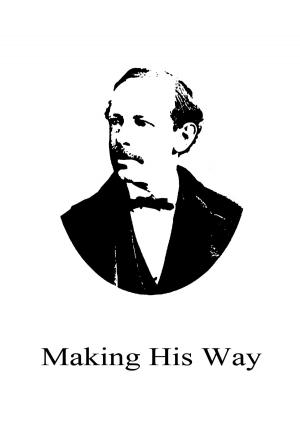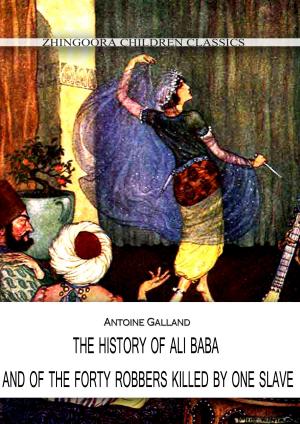| Author: | Rabindranath Tagore | ISBN: | 1230000013012 |
| Publisher: | Zhingoora Books | Publication: | August 20, 2012 |
| Imprint: | Language: | English |
| Author: | Rabindranath Tagore |
| ISBN: | 1230000013012 |
| Publisher: | Zhingoora Books |
| Publication: | August 20, 2012 |
| Imprint: | |
| Language: | English |
CONTENTS
INTRODUCTION 1
ACT I
ACT II
ACT III
ACT IV
INTRODUCTION
Characters of the Prelude
King, Vizier, General (Bijoy Varma)
Chinese Ambassador, Pundit (Sruti-bhushan)
Poet (Kabi-shekhar), Guards, Courtiers, Herald
The stage is on two levels: the higher, at the back, for the Song-preludes alone, concealed by a purple curtain; the lower only being discovered when the drop goes up. Diagonally across the extreme left of the lower stage, is arranged the king's court, with various platforms, for the various dignitaries ascending to the canopied throne. The body of the stage is left free for the "Play" when that develops.
(Enter some Courtiers.)
[The names of the speakers are not given in the margin, as they can easily be guessed.]
Hush! Hush!
What is the matter?
The King is in great distress.
How dreadful!
Who is that over there, playing on his flute?
Why? What's the matter?
The King is greatly disturbed.
How dreadful!
What are those wild children doing, making so much noise?
They are the Mandal family.
Then tell the Mandal family to keep their children quiet.
Where can that Vizier have gone to?
Here I am. What's the matter?
Haven't you heard the news?
No, what?
The King is greatly troubled in his mind.
Well, I've got some very important news about the frontier war.
War we may have, but not the news.
Then the Chinese Ambassador is waiting to see His Majesty.
Let him wait. Anyhow he can't see the King.
Can't see the King?—Ah, here is the King at last. Look at him coming this way, with a mirror in his hand. "Long live the King. Long live the King."
If it please Your Majesty, it is time to go to the Court.
Time to go? Yes, time to go, but not to the Court.
What does Your Majesty mean?
Haven't you heard? The bell has just been rung to dismiss the Court.
When? What bell? We haven't heard any bell.
How could you hear? They have rung it in my ears alone.
Oh, Sire. No one can have had the impertinence to do that.
Vizier! They are ringing it now.
Pardon me, Sire, if I am very stupid; but I cannot understand.
Look at this, Vizier, look at this.
Your Majesty's hair——
Can't you see there's a bell-ringer there?
Oh, Your Majesty. Are you playing a joke?
The joke is not mine, but His, who has got the whole world by the ear, and is having His jest. Last night, when the Queen was putting a garland of jasmines round my neck, she cried out with alarm, "King, what is this? Here are two grey hairs behind your ear."
Oh, please, Sire, don't worry so much about a little thing like that. Why! The royal physician——
Vizier! The founder of our dynasty had his royal physician, too. But what could he do? Death has left his card of invitation behind my ear. The Queen wanted, then and there, to pluck out the grey hairs. But I said, "Queen, what's the use? You may remove Death's invitation, but can you remove Death, the Inviter?" So, for the present——
Yes, Sire, for the present, let us attend to business.
Business, Vizier! I have no time for business. Send for the Pundit. Send for Sruti-bhushan.
But, Sire, the General——
The General?—No, no, not the General. Send for the Pundit.
But, the news from the frontier——
Vizier, the news has come to me from the last great frontier of all, the frontier of Death. Send for the Pundit.
But if Your Majesty will give me one moment, the Ambassador from the great Emperor of China——
Vizier, a greater Emperor has sent his embassy to me. Call Sruti-bhushan.
Very well, Sire. But your father-in-law——
It is not my father-in-law whom I want now. Send for the Pundit.
But, if it please you to hear me this once. The poet, Kabi-shekhar, is waiting with his new book called the Garden of Poesy.
Let your poet disport himself, jumping about on the topmost branches of his Garden of Poesy, but send for the Pundit.
Very well, Sire. I will send for him at once.
Tell him to bring his book of devotions with him, called the Ocean of Renunciation.
Yes, Sire.
But, Vizier. Who are those outside making all that noise? Go out and stop them at once. I must have peace.
If it please Your Majesty, there is a famine in Nagapatam and the headmen of the villages are praying to be allowed to see your face.
My time is short, Vizier. I must have peace.
They say their time is shorter. They are at death's door. They, too, want peace,—peace from the burning of hunger.
Vizier! The burning of hunger is quenched at last on the funeral pyre.
Then these wretched people——
Wretched!—Listen to the advice of a wretched King to his wretched subjects. It is futile to be impatient, and try to break through the net of the inexorable Fisherman. Sooner or later, Death the Fisherman will have his haul.
Well then?
Let me have the Pundit, and his Book of Renunciation.
And in this scarcity——
Vizier! The real scarcity is of time, and not of food. We are all suffering from starvation of time. None of us has enough of it, neither the King, nor his people.
Then——
Then know, that our petitions for more time will all go to the last fire of doom. So why strain our voice in prayer?—Ah, here is Sruti-bhushan at last. My reverence to you.
Pundit, do tell the King that the Goddess of Fortune deserts him who gives way to melancholy.
Sruti-bhushan, what is my Vizier whispering to you?
He tells me, King, to instruct you in the ways of fortune.
What instruction can you give?
There is a verse in my book of devotions which runs as follows:
Fortune, as fickle as lotus-flower,Closes her favours when comes the hour.Oh, foolish man, how can you trust her,Who comes of a sudden, and goes in a fluster?
Ah, Pundit. One breath of your teaching blows out the false flame of ambition. Our teacher has said:
"Teeth fall out, hair grows grey;Yet man clings to hope that plays him false."
Well, King, now that you have introduced the subject of hope, let me give you another verse from the Ocean of Renunciation. It runs as follows:
That fetters are binding, all are aware;But fetters of hope are strange, I declare.Hope's captive is tossed in the whirlpool's wake,And only grows still when the fetters break.
Ah, Pundit. Your words are priceless. Vizier, give him a hundred gold sequins at once. What's that noise outside?
It is the famine-stricken people.
Tell them to hold their peace.
Let Sruti-bhushan, with his book of devotions, go and try to bring them peace; and, in the meanwhile, Your Majesty might discuss war matters——
No, no. Let the war matters come later. I can't let Sruti-bhushan go yet.
King, you said something to me, a moment ago, about a gift of gold. Now mere gold, by itself, does not confer any permanent benefit. It is said in my book of devotions, called the Ocean of Renunciation:
He who gives gold, gives only pain;When the gold is spent grief comes again.When a lakh, or crore, of gold is spent,Grief only remains in the empty tent.
Ah, Pundit. How exquisite. So you don't want any gold, my Master?
No, King, I don't want gold, but something more permanent, which would make your merit permanent also. I should be quite content, if you gave me the living of Kanchanpur. For it is said in theRenunciation——
No, Pundit, I quite understand. You needn't quote scripture to support your claim. I understand quite well—Vizier!
Yes, Your Majesty.
See that the rich province of Kanchanpur is settled on the Pundit.—What's the matter now outside there? What are they crying for?
If it please Your Majesty, it is the people.
Why do they cry so repeatedly?
Their cry is repeated, I admit, but the reason remains most monotonously the same. They are starving.
But, King, I must tell you before I forget it. It is the one desire of my wife to make her whole body jingle, from head to foot, in praise of your munificence; but, alas, the sound is too feeble for want of proper ornaments.
I understand you, Pundit. Vizier! Order ornaments from the Court Jeweller for Sruti-bhushan's wife immediately.
And, King, while he is about it, would you tell the Vizier, that we are both of us distracted in our devotions by house-repairs. Let him ask the royal masons to put up a thoroughly well-built house, where we can practise our devotions in peace.
Very well, Pundit.—Vizier!
Yes, Your Majesty.
Give the order at once.
Sire, your treasury is empty. Funds are wanting.
Pooh! That's an old story. I hear that every year. It is your business to increase the funds, and mine to increase the wants. What do you say, Sruti-bhushan?
King, I cannot blame the Vizier. He is looking after your treasures in this world. We are looking after your treasures in the next. So where he sees want, we see wealth. Now, if you would only let me dive deep once more into the Ocean of Renunciation you will find it written as follows:
That King's coffers are well stored,Where wealth alone on worth is poured.
Pundit, your company is most valuable.
Your Majesty, Sruti-bhushan knows its value to a farthing. Come, Sruti-bhushan, make haste. Let us collect all the wealth you need for your Treasury of Devotion. For wealth has the ugly habit of diminishing fast. If we are not quick about it, little will remain to enable us to observe our renunciation with all splendour.
Yes, Vizier, let us go at once. (To the King.) When he is making such a fuss about a tiny matter like this, it is best to pacify him first and then return to you afterwards.
Pundit, I am afraid that, some day, you will leave my royal protection altogether, and retire to the forest.
King, so long as I find contentment in a King's palace, it is as good as a hermitage for my peace of mind. I must now leave you, King. Vizier, let us go.
[The Vizier and Pundit go out.
Oh, dear me! Whatever shall I do? Here's the Poet coming. I am afraid he'll make me break all my good resolutions.—Oh, my grey hairs, cover my ears, so that the Poet's allurements may not enter.
Why, King, what's the matter? I hear you want to send away your Poet.
What have I to do with poets, when poetry brings me this parting message?
What parting message?
Look at this behind my ear. Don't you see it?
See what? Grey hairs? Why, King, don't you worry about that.
Poet, Nature is trying to rub out the green of youth, and to paint everything white.
No, no, King. You haven't understood the artist. On that white ground, Nature will paint new colours.
I don't see any sign of colours yet.
They are all within. In the heart of the white dwell all the colours of the rainbow.
Oh, Poet, do be quiet. You disturb me when you talk like that.
King, if this youth fades, let it fade. Another Queen of Youth is coming. And she is putting a garland of pure white jasmines round your head, in order to be your bride. The wedding festival is being made ready, behind the scene.
Oh, dear, Poet. You will undo everything. Do go away. Ho there, Guard. Go at once and call Sruti-bhushan.
What will you do with him, King, when he comes?
I will compose my mind, and practise my renunciation.
Ah, King, when I heard that news, I came at once. For I can be your companion in this practice of renunciation.
You?
Yes, I, King. We Poets exist for this very purpose. We set men free from their desires.
I don't understand you. You talk in riddles.
What? You don't understand me? And yet you have been reading my poems all this while!—There is renunciation in our words, renunciation in the metre, renunciation in our music. That is why fortune always forsakes us; and we, in turn always forsake fortune. We go about, all day long, initiating the youths in the sacred cult of fortune-forsaking.
What does it say to us?
It says:
"Ah, brothers, don't cling to your goods and chattels,And sit ever in the corner of your room.Come out, come out into the open world.Come out into the highways of life.Come out, ye youthful Renouncers."
But, Poet, do you really mean to say that the highway of the open world is the pathway of renunciation?
Why not, King? In the open world all is change, all is life, all is movement. And he who ever moves and journeys with this life-movement, dancing and playing on his flute as he goes, he is the true Renouncer. He is the true disciple of the minstrel Poet.
But how then can I get peace? I must have peace.
Oh, King, we haven't the least desire for peace. We are the Renouncers.
But ought we not to get that treasure, which is said to be never-changing?
No, we don't covet any never-changing treasures. We are the Renouncers.
What do you mean? Oh, dear, Poet, you will undo everything, if you talk like that. You are destroying my peace of mind. Call Sruti-bhushan. Let some one call the Pundit.
What I mean, King, is this. We are the true Renouncers, because change is our very secret. We lose, in order to find. We have no faith in the never-changing.
What do you mean?
Haven't you noticed the detachment of the rushing river, as it runs splashing from its mountain cave? It gives itself away so swiftly, and only thus it finds itself. What is never-changing, for the river, is the desert sand, where it loses its course.
Ah, but listen, Poet—listen to those cries there outside. That is your world. How do you deal with that?
King, they are your starving people.
My people, Poet? Why do you call them that? They are the world's people, not mine. Have I created their miseries? What can your youthful Poet Renouncers do to relieve sufferings like theirs? Tell me that.
King, it is we alone who can truly bear those sufferings, because we are like the river that flows on in gladness, thus lightening our burden, and the burden of the world. But the hard, metalled road is fixed and never-changing. And so it makes the burden more burdensome. The heavy loads groan and creak along it, and cut deep gashes in its breast. We Poets call to every one to carry all their joys and sorrows lightly, in a rhythmic measure. Our call is the Renouncers' call.
Ah, Poet, now I don't care a straw for Sruti-bhushan. Let the Pundit go hang. But, do you know what my trouble is now? Though I can't, for the life of me, understand your words, the music haunts me. Now, it's just the other way round with the Pundit. His words are clear enough, and they obey the rules of syntax quite correctly. But the tune!—No, it's no use telling you any further.
King, our words don't speak, they sing.
Well, Poet, what do you want to do now?
King, I'm going to have a race through those cries, which are rising outside your gate.
What do you mean? Famine relief is for men of business. Poets oughtn't to have anything to do with things like that.
King, business men always make their business so out of tune. That is why we Poets hasten to tune it.
Now come, my dear Poet, do speak in plainer language.
King, they work, because they must. We work, because we are in love with life. That is why they condemn us as unpractical, and we condemn them as lifeless.
But who is right, Poet? Who wins? You, or they?
We, King, we. We always win.
But, Poet, your proof——
King, the greatest things in the world disdain proof. But if you could for a time wipe out all the poets and all their poetry from the world, then you would soon discover, by their very absence, where the men of action got their energy from, and who really supplied the life-sap to their harvest-field. It is not those who have plunged deep down into the Pundit's Ocean of Renunciation, nor those who are always clinging to their possessions; it is not those who have become adepts in turning out quantities of work, nor those who are ever telling the dry beads of duty,—it is not these who win at last. But it is those who love, because they live. These truly win, for they truly surrender. They accept pain with all their strength and with all their strength they remove pain. It is they who create, because they know the secret of true joy, which is the secret of detachment.
Well then, Poet, if that be so, what do you ask me to do now?
I ask you, King, to rise up and move. That cry outside yonder is the cry of life to life. And if the life within you is not stirred, in response to that call without, then there is cause for anxiety indeed,—not because duty has been neglected, but because you are dying.
But, Poet, surely we must die, sooner or later?
No, King, that's a lie. When we feel for certain that we are alive, then we know for certain that we shall go on living. Those who have never put life to the test, in all possible ways, these keep on crying out:
Life is fleeting, Life is waning,Life is like a dew-drop on a lotus leaf.
But, isn't life inconstant?
Only because its movement is unceasing. The moment you stop this movement, that moment you begin to play the drama of Death.
Poet, are you speaking the truth? Shall we really go on living?
Yes, we shall really go on living.
Then, Poet, if we are going to go on living, we must make our life worth its eternity. Is not that so?
Yes, indeed.
Ho, Guard.
Yes, Your Royal Highness.
Call the Vizier at once.
Yes, Your Royal Highness.
(Vizier enters.)
What is Your Majesty's pleasure?
Vizier! Why on earth have you kept me waiting so long?
I was very busy, Your Majesty.
Busy? What were you busy about?
I was dismissing the General.
Why should you dismiss the General? We have got to discuss war matters with him.
And arrangements had to be made for the state-departure of the Chinese Ambassador.
What do you mean by his state-departure?
If it please Your Majesty, you did not grant him an interview. So he——
Vizier! You surprise me. Is this the way you manage state affairs? What has happened to you? Have you lost your senses?
Then, again. Sire, I was trying to find a way to pull down the Poet's house. At first, no one would undertake it. Then, at last, all the Pundits of the Royal School of Grammar and Logic came up with their proper tools and set to work.
Vizier! Are you mad this morning? Pull down the Poet's house? Why, you might as well kill all the birds in the garden and make them up into a pie.
If it please Your Majesty, you need not be annoyed. We shan't have to pull down the house after all; for the moment Sruti-bhushan heard it was to be demolished, he decided to take possession of it himself.
What, Vizier! That's worse still. Why! The Goddess of Music would break her harp in pieces against my head, if she even heard of such a thing. No, that can't be.
Then, Your Majesty, there was another thing to be got through. We had to deliver over the province of Kanchanpur to the Pundit.
No, Vizier! What a mess you are making. That must go to our Poet.
To me, King? No. My poetry never accepts reward.
Well, well. Let the Pundit have it.
And, last of all, Sire. I have issued orders to the soldiers to disperse the crowd of famine-stricken people.
Vizier, you are doing nothing but blunder. The best way to disperse the famished people is with food, not force.
(Guard enters.)
May it please Your Royal Highness.
What's the matter, Guard?
May it please Your Royal Highness, here is Sruti-bhushan, the Pundit, coming back with his Book of Devotions.
Oh, stop him, Vizier, stop him. He will undo everything. Don't let him come upon me unawares like this. In a moment of weakness, I may suddenly find myself out of my depths in the Ocean of Renunciation. Poet! Don't give me time for that. Do something. Do anything. Have you got anything ready to hand? Any play toward? Any poem? Any masque? Any——
Yes, King. I have got the very thing. But whether it is a drama, or a poem, or a play, or a masque, I cannot say.
Shall I be able to understand the sense of what you have written?
No, King, what a poet writes is not meant to have any sense.
What then?
To have the tune itself.
What do you mean? Is there no philosophy in it?
No, none at all, thank goodness.
What does it say, then?
King, it says "I exist." Don't you know the meaning of the first cry of the new-born child? The child, when it is born, hears at once the cries of the earth and water and sky, which surround him,—and they all cry to him, "We exist," and his tiny little heart responds, and cries out in its turn, "I exist." My poetry is like the cry of that new-born child. It is a response to the cry of the Universe.
Is it nothing more than that, Poet?
No, nothing more. There is life in my song, which cries, "In joy and in sorrow, in work and in rest, in life and in death, in victory and in defeat, in this world and in the next, all hail to the 'I exist.'"
Well, Poet, I can assure you, if your play hasn't got any philosophy in it, it won't pass muster in these days.
That's true, King. The newer people, of this modern age, are more eager to amass than to realize. They are, in their generation, wiser than the children of light.
Whom shall we ask, then, for an audience? Shall we ask the young students of our royal school?
No, King, they cut up poetry with their logic. They are like the young-horned deer trying their new horns on the flower-beds.
Whom should I ask, then?
Ask those whose hair is turning grey.
What do you mean, Poet?
The youth of these middle-aged people is a youth of detachment. They have just crossed the waters of pleasure, and are in sight of the land of pure gladness. They don't want to eat fruit, but to produce it.
I, at least, have now reached that age of discretion, and ought to be able to appreciate your songs. Shall I ask the General?
Yes, ask him.
And the Chinese Ambassador?
Yes, ask him too.
I hear my father-in-law has come.
Well, ask him too, but I have my doubts about his youthful sons.
But don't forget his daughter.
Don't worry about her. She won't let herself be forgotten.
And Sruti-bhushan? Shall I ask him?
No, King, no. Decidedly, no. I have no grudge against him. Why should I inflict this on him?
Very well, Poet. Off with you. Make your stage preparations.
No, King. We are going to act this play without any special preparations. Truth looks tawdry when she is overdressed.
But, Poet, there must be some canvas for a background.
No. Our only background is the mind. On that we shall summon up a picture with the magic wand of music.
Are there any songs in the play?
Yes, King. The door of each act will be opened by the key of song.
What is the subject of the songs?
The Disrobing of Winter.
But, Poet, we haven't read about that in any Mythology.
In the world-myth this song comes round in its turn. In the play of the seasons, each year, the mask of the Old Man, Winter, is pulled off, and the form of Spring is revealed in all its beauty. Thus we see that the old is ever new.
Well, Poet, so much for the songs: but what about the remainder?
Oh, that is all about life.
Life? What is life?
This is how it runs: A band of young companions has run off in pursuit of one Old Man. They have taken a vow to catch him. They enter into a cave; they take hold of him, and then——
Then, what? What did they see?
Ah. That will be told in its own good time.
But, I haven't understood one thing. Your drama and your songs,—have they different subjects, or the same?
The same, King. The play of Spring in nature is the counterpart of the play of Youth in our lives. It is simply from the lyrical drama of the World Poet that I have stolen this plot.
Who, then, are the chief characters?
One is called the Leader.
Who is he, Poet?
He is the guiding impulse in our life. Another is Chandra.
Who is he?
He who makes life dear to us.
And who else?
Then there is Dada, to whom duty is the essence of life, not joy.
Is there any one else?
Yes, the blind Minstrel.
Blind?
Because he does not see with his eyes, therefore he sees with his whole body and mind and soul.
Who else is there, in your play, among the chief actors?
You are there, King.
I?
Yes, you, King. For if you stayed out of it, instead of coming into it, then the King would begin to abuse the Poet and send for Sruti-bhushan again. And then there would be no hope of salvation for him. For the World Poet himself would be defeated. And the South Wind of Spring would have to retire, without receiving its homage.
________________________________________
CONTENTS
INTRODUCTION 1
ACT I
ACT II
ACT III
ACT IV
INTRODUCTION
Characters of the Prelude
King, Vizier, General (Bijoy Varma)
Chinese Ambassador, Pundit (Sruti-bhushan)
Poet (Kabi-shekhar), Guards, Courtiers, Herald
The stage is on two levels: the higher, at the back, for the Song-preludes alone, concealed by a purple curtain; the lower only being discovered when the drop goes up. Diagonally across the extreme left of the lower stage, is arranged the king's court, with various platforms, for the various dignitaries ascending to the canopied throne. The body of the stage is left free for the "Play" when that develops.
(Enter some Courtiers.)
[The names of the speakers are not given in the margin, as they can easily be guessed.]
Hush! Hush!
What is the matter?
The King is in great distress.
How dreadful!
Who is that over there, playing on his flute?
Why? What's the matter?
The King is greatly disturbed.
How dreadful!
What are those wild children doing, making so much noise?
They are the Mandal family.
Then tell the Mandal family to keep their children quiet.
Where can that Vizier have gone to?
Here I am. What's the matter?
Haven't you heard the news?
No, what?
The King is greatly troubled in his mind.
Well, I've got some very important news about the frontier war.
War we may have, but not the news.
Then the Chinese Ambassador is waiting to see His Majesty.
Let him wait. Anyhow he can't see the King.
Can't see the King?—Ah, here is the King at last. Look at him coming this way, with a mirror in his hand. "Long live the King. Long live the King."
If it please Your Majesty, it is time to go to the Court.
Time to go? Yes, time to go, but not to the Court.
What does Your Majesty mean?
Haven't you heard? The bell has just been rung to dismiss the Court.
When? What bell? We haven't heard any bell.
How could you hear? They have rung it in my ears alone.
Oh, Sire. No one can have had the impertinence to do that.
Vizier! They are ringing it now.
Pardon me, Sire, if I am very stupid; but I cannot understand.
Look at this, Vizier, look at this.
Your Majesty's hair——
Can't you see there's a bell-ringer there?
Oh, Your Majesty. Are you playing a joke?
The joke is not mine, but His, who has got the whole world by the ear, and is having His jest. Last night, when the Queen was putting a garland of jasmines round my neck, she cried out with alarm, "King, what is this? Here are two grey hairs behind your ear."
Oh, please, Sire, don't worry so much about a little thing like that. Why! The royal physician——
Vizier! The founder of our dynasty had his royal physician, too. But what could he do? Death has left his card of invitation behind my ear. The Queen wanted, then and there, to pluck out the grey hairs. But I said, "Queen, what's the use? You may remove Death's invitation, but can you remove Death, the Inviter?" So, for the present——
Yes, Sire, for the present, let us attend to business.
Business, Vizier! I have no time for business. Send for the Pundit. Send for Sruti-bhushan.
But, Sire, the General——
The General?—No, no, not the General. Send for the Pundit.
But, the news from the frontier——
Vizier, the news has come to me from the last great frontier of all, the frontier of Death. Send for the Pundit.
But if Your Majesty will give me one moment, the Ambassador from the great Emperor of China——
Vizier, a greater Emperor has sent his embassy to me. Call Sruti-bhushan.
Very well, Sire. But your father-in-law——
It is not my father-in-law whom I want now. Send for the Pundit.
But, if it please you to hear me this once. The poet, Kabi-shekhar, is waiting with his new book called the Garden of Poesy.
Let your poet disport himself, jumping about on the topmost branches of his Garden of Poesy, but send for the Pundit.
Very well, Sire. I will send for him at once.
Tell him to bring his book of devotions with him, called the Ocean of Renunciation.
Yes, Sire.
But, Vizier. Who are those outside making all that noise? Go out and stop them at once. I must have peace.
If it please Your Majesty, there is a famine in Nagapatam and the headmen of the villages are praying to be allowed to see your face.
My time is short, Vizier. I must have peace.
They say their time is shorter. They are at death's door. They, too, want peace,—peace from the burning of hunger.
Vizier! The burning of hunger is quenched at last on the funeral pyre.
Then these wretched people——
Wretched!—Listen to the advice of a wretched King to his wretched subjects. It is futile to be impatient, and try to break through the net of the inexorable Fisherman. Sooner or later, Death the Fisherman will have his haul.
Well then?
Let me have the Pundit, and his Book of Renunciation.
And in this scarcity——
Vizier! The real scarcity is of time, and not of food. We are all suffering from starvation of time. None of us has enough of it, neither the King, nor his people.
Then——
Then know, that our petitions for more time will all go to the last fire of doom. So why strain our voice in prayer?—Ah, here is Sruti-bhushan at last. My reverence to you.
Pundit, do tell the King that the Goddess of Fortune deserts him who gives way to melancholy.
Sruti-bhushan, what is my Vizier whispering to you?
He tells me, King, to instruct you in the ways of fortune.
What instruction can you give?
There is a verse in my book of devotions which runs as follows:
Fortune, as fickle as lotus-flower,Closes her favours when comes the hour.Oh, foolish man, how can you trust her,Who comes of a sudden, and goes in a fluster?
Ah, Pundit. One breath of your teaching blows out the false flame of ambition. Our teacher has said:
"Teeth fall out, hair grows grey;Yet man clings to hope that plays him false."
Well, King, now that you have introduced the subject of hope, let me give you another verse from the Ocean of Renunciation. It runs as follows:
That fetters are binding, all are aware;But fetters of hope are strange, I declare.Hope's captive is tossed in the whirlpool's wake,And only grows still when the fetters break.
Ah, Pundit. Your words are priceless. Vizier, give him a hundred gold sequins at once. What's that noise outside?
It is the famine-stricken people.
Tell them to hold their peace.
Let Sruti-bhushan, with his book of devotions, go and try to bring them peace; and, in the meanwhile, Your Majesty might discuss war matters——
No, no. Let the war matters come later. I can't let Sruti-bhushan go yet.
King, you said something to me, a moment ago, about a gift of gold. Now mere gold, by itself, does not confer any permanent benefit. It is said in my book of devotions, called the Ocean of Renunciation:
He who gives gold, gives only pain;When the gold is spent grief comes again.When a lakh, or crore, of gold is spent,Grief only remains in the empty tent.
Ah, Pundit. How exquisite. So you don't want any gold, my Master?
No, King, I don't want gold, but something more permanent, which would make your merit permanent also. I should be quite content, if you gave me the living of Kanchanpur. For it is said in theRenunciation——
No, Pundit, I quite understand. You needn't quote scripture to support your claim. I understand quite well—Vizier!
Yes, Your Majesty.
See that the rich province of Kanchanpur is settled on the Pundit.—What's the matter now outside there? What are they crying for?
If it please Your Majesty, it is the people.
Why do they cry so repeatedly?
Their cry is repeated, I admit, but the reason remains most monotonously the same. They are starving.
But, King, I must tell you before I forget it. It is the one desire of my wife to make her whole body jingle, from head to foot, in praise of your munificence; but, alas, the sound is too feeble for want of proper ornaments.
I understand you, Pundit. Vizier! Order ornaments from the Court Jeweller for Sruti-bhushan's wife immediately.
And, King, while he is about it, would you tell the Vizier, that we are both of us distracted in our devotions by house-repairs. Let him ask the royal masons to put up a thoroughly well-built house, where we can practise our devotions in peace.
Very well, Pundit.—Vizier!
Yes, Your Majesty.
Give the order at once.
Sire, your treasury is empty. Funds are wanting.
Pooh! That's an old story. I hear that every year. It is your business to increase the funds, and mine to increase the wants. What do you say, Sruti-bhushan?
King, I cannot blame the Vizier. He is looking after your treasures in this world. We are looking after your treasures in the next. So where he sees want, we see wealth. Now, if you would only let me dive deep once more into the Ocean of Renunciation you will find it written as follows:
That King's coffers are well stored,Where wealth alone on worth is poured.
Pundit, your company is most valuable.
Your Majesty, Sruti-bhushan knows its value to a farthing. Come, Sruti-bhushan, make haste. Let us collect all the wealth you need for your Treasury of Devotion. For wealth has the ugly habit of diminishing fast. If we are not quick about it, little will remain to enable us to observe our renunciation with all splendour.
Yes, Vizier, let us go at once. (To the King.) When he is making such a fuss about a tiny matter like this, it is best to pacify him first and then return to you afterwards.
Pundit, I am afraid that, some day, you will leave my royal protection altogether, and retire to the forest.
King, so long as I find contentment in a King's palace, it is as good as a hermitage for my peace of mind. I must now leave you, King. Vizier, let us go.
[The Vizier and Pundit go out.
Oh, dear me! Whatever shall I do? Here's the Poet coming. I am afraid he'll make me break all my good resolutions.—Oh, my grey hairs, cover my ears, so that the Poet's allurements may not enter.
Why, King, what's the matter? I hear you want to send away your Poet.
What have I to do with poets, when poetry brings me this parting message?
What parting message?
Look at this behind my ear. Don't you see it?
See what? Grey hairs? Why, King, don't you worry about that.
Poet, Nature is trying to rub out the green of youth, and to paint everything white.
No, no, King. You haven't understood the artist. On that white ground, Nature will paint new colours.
I don't see any sign of colours yet.
They are all within. In the heart of the white dwell all the colours of the rainbow.
Oh, Poet, do be quiet. You disturb me when you talk like that.
King, if this youth fades, let it fade. Another Queen of Youth is coming. And she is putting a garland of pure white jasmines round your head, in order to be your bride. The wedding festival is being made ready, behind the scene.
Oh, dear, Poet. You will undo everything. Do go away. Ho there, Guard. Go at once and call Sruti-bhushan.
What will you do with him, King, when he comes?
I will compose my mind, and practise my renunciation.
Ah, King, when I heard that news, I came at once. For I can be your companion in this practice of renunciation.
You?
Yes, I, King. We Poets exist for this very purpose. We set men free from their desires.
I don't understand you. You talk in riddles.
What? You don't understand me? And yet you have been reading my poems all this while!—There is renunciation in our words, renunciation in the metre, renunciation in our music. That is why fortune always forsakes us; and we, in turn always forsake fortune. We go about, all day long, initiating the youths in the sacred cult of fortune-forsaking.
What does it say to us?
It says:
"Ah, brothers, don't cling to your goods and chattels,And sit ever in the corner of your room.Come out, come out into the open world.Come out into the highways of life.Come out, ye youthful Renouncers."
But, Poet, do you really mean to say that the highway of the open world is the pathway of renunciation?
Why not, King? In the open world all is change, all is life, all is movement. And he who ever moves and journeys with this life-movement, dancing and playing on his flute as he goes, he is the true Renouncer. He is the true disciple of the minstrel Poet.
But how then can I get peace? I must have peace.
Oh, King, we haven't the least desire for peace. We are the Renouncers.
But ought we not to get that treasure, which is said to be never-changing?
No, we don't covet any never-changing treasures. We are the Renouncers.
What do you mean? Oh, dear, Poet, you will undo everything, if you talk like that. You are destroying my peace of mind. Call Sruti-bhushan. Let some one call the Pundit.
What I mean, King, is this. We are the true Renouncers, because change is our very secret. We lose, in order to find. We have no faith in the never-changing.
What do you mean?
Haven't you noticed the detachment of the rushing river, as it runs splashing from its mountain cave? It gives itself away so swiftly, and only thus it finds itself. What is never-changing, for the river, is the desert sand, where it loses its course.
Ah, but listen, Poet—listen to those cries there outside. That is your world. How do you deal with that?
King, they are your starving people.
My people, Poet? Why do you call them that? They are the world's people, not mine. Have I created their miseries? What can your youthful Poet Renouncers do to relieve sufferings like theirs? Tell me that.
King, it is we alone who can truly bear those sufferings, because we are like the river that flows on in gladness, thus lightening our burden, and the burden of the world. But the hard, metalled road is fixed and never-changing. And so it makes the burden more burdensome. The heavy loads groan and creak along it, and cut deep gashes in its breast. We Poets call to every one to carry all their joys and sorrows lightly, in a rhythmic measure. Our call is the Renouncers' call.
Ah, Poet, now I don't care a straw for Sruti-bhushan. Let the Pundit go hang. But, do you know what my trouble is now? Though I can't, for the life of me, understand your words, the music haunts me. Now, it's just the other way round with the Pundit. His words are clear enough, and they obey the rules of syntax quite correctly. But the tune!—No, it's no use telling you any further.
King, our words don't speak, they sing.
Well, Poet, what do you want to do now?
King, I'm going to have a race through those cries, which are rising outside your gate.
What do you mean? Famine relief is for men of business. Poets oughtn't to have anything to do with things like that.
King, business men always make their business so out of tune. That is why we Poets hasten to tune it.
Now come, my dear Poet, do speak in plainer language.
King, they work, because they must. We work, because we are in love with life. That is why they condemn us as unpractical, and we condemn them as lifeless.
But who is right, Poet? Who wins? You, or they?
We, King, we. We always win.
But, Poet, your proof——
King, the greatest things in the world disdain proof. But if you could for a time wipe out all the poets and all their poetry from the world, then you would soon discover, by their very absence, where the men of action got their energy from, and who really supplied the life-sap to their harvest-field. It is not those who have plunged deep down into the Pundit's Ocean of Renunciation, nor those who are always clinging to their possessions; it is not those who have become adepts in turning out quantities of work, nor those who are ever telling the dry beads of duty,—it is not these who win at last. But it is those who love, because they live. These truly win, for they truly surrender. They accept pain with all their strength and with all their strength they remove pain. It is they who create, because they know the secret of true joy, which is the secret of detachment.
Well then, Poet, if that be so, what do you ask me to do now?
I ask you, King, to rise up and move. That cry outside yonder is the cry of life to life. And if the life within you is not stirred, in response to that call without, then there is cause for anxiety indeed,—not because duty has been neglected, but because you are dying.
But, Poet, surely we must die, sooner or later?
No, King, that's a lie. When we feel for certain that we are alive, then we know for certain that we shall go on living. Those who have never put life to the test, in all possible ways, these keep on crying out:
Life is fleeting, Life is waning,Life is like a dew-drop on a lotus leaf.
But, isn't life inconstant?
Only because its movement is unceasing. The moment you stop this movement, that moment you begin to play the drama of Death.
Poet, are you speaking the truth? Shall we really go on living?
Yes, we shall really go on living.
Then, Poet, if we are going to go on living, we must make our life worth its eternity. Is not that so?
Yes, indeed.
Ho, Guard.
Yes, Your Royal Highness.
Call the Vizier at once.
Yes, Your Royal Highness.
(Vizier enters.)
What is Your Majesty's pleasure?
Vizier! Why on earth have you kept me waiting so long?
I was very busy, Your Majesty.
Busy? What were you busy about?
I was dismissing the General.
Why should you dismiss the General? We have got to discuss war matters with him.
And arrangements had to be made for the state-departure of the Chinese Ambassador.
What do you mean by his state-departure?
If it please Your Majesty, you did not grant him an interview. So he——
Vizier! You surprise me. Is this the way you manage state affairs? What has happened to you? Have you lost your senses?
Then, again. Sire, I was trying to find a way to pull down the Poet's house. At first, no one would undertake it. Then, at last, all the Pundits of the Royal School of Grammar and Logic came up with their proper tools and set to work.
Vizier! Are you mad this morning? Pull down the Poet's house? Why, you might as well kill all the birds in the garden and make them up into a pie.
If it please Your Majesty, you need not be annoyed. We shan't have to pull down the house after all; for the moment Sruti-bhushan heard it was to be demolished, he decided to take possession of it himself.
What, Vizier! That's worse still. Why! The Goddess of Music would break her harp in pieces against my head, if she even heard of such a thing. No, that can't be.
Then, Your Majesty, there was another thing to be got through. We had to deliver over the province of Kanchanpur to the Pundit.
No, Vizier! What a mess you are making. That must go to our Poet.
To me, King? No. My poetry never accepts reward.
Well, well. Let the Pundit have it.
And, last of all, Sire. I have issued orders to the soldiers to disperse the crowd of famine-stricken people.
Vizier, you are doing nothing but blunder. The best way to disperse the famished people is with food, not force.
(Guard enters.)
May it please Your Royal Highness.
What's the matter, Guard?
May it please Your Royal Highness, here is Sruti-bhushan, the Pundit, coming back with his Book of Devotions.
Oh, stop him, Vizier, stop him. He will undo everything. Don't let him come upon me unawares like this. In a moment of weakness, I may suddenly find myself out of my depths in the Ocean of Renunciation. Poet! Don't give me time for that. Do something. Do anything. Have you got anything ready to hand? Any play toward? Any poem? Any masque? Any——
Yes, King. I have got the very thing. But whether it is a drama, or a poem, or a play, or a masque, I cannot say.
Shall I be able to understand the sense of what you have written?
No, King, what a poet writes is not meant to have any sense.
What then?
To have the tune itself.
What do you mean? Is there no philosophy in it?
No, none at all, thank goodness.
What does it say, then?
King, it says "I exist." Don't you know the meaning of the first cry of the new-born child? The child, when it is born, hears at once the cries of the earth and water and sky, which surround him,—and they all cry to him, "We exist," and his tiny little heart responds, and cries out in its turn, "I exist." My poetry is like the cry of that new-born child. It is a response to the cry of the Universe.
Is it nothing more than that, Poet?
No, nothing more. There is life in my song, which cries, "In joy and in sorrow, in work and in rest, in life and in death, in victory and in defeat, in this world and in the next, all hail to the 'I exist.'"
Well, Poet, I can assure you, if your play hasn't got any philosophy in it, it won't pass muster in these days.
That's true, King. The newer people, of this modern age, are more eager to amass than to realize. They are, in their generation, wiser than the children of light.
Whom shall we ask, then, for an audience? Shall we ask the young students of our royal school?
No, King, they cut up poetry with their logic. They are like the young-horned deer trying their new horns on the flower-beds.
Whom should I ask, then?
Ask those whose hair is turning grey.
What do you mean, Poet?
The youth of these middle-aged people is a youth of detachment. They have just crossed the waters of pleasure, and are in sight of the land of pure gladness. They don't want to eat fruit, but to produce it.
I, at least, have now reached that age of discretion, and ought to be able to appreciate your songs. Shall I ask the General?
Yes, ask him.
And the Chinese Ambassador?
Yes, ask him too.
I hear my father-in-law has come.
Well, ask him too, but I have my doubts about his youthful sons.
But don't forget his daughter.
Don't worry about her. She won't let herself be forgotten.
And Sruti-bhushan? Shall I ask him?
No, King, no. Decidedly, no. I have no grudge against him. Why should I inflict this on him?
Very well, Poet. Off with you. Make your stage preparations.
No, King. We are going to act this play without any special preparations. Truth looks tawdry when she is overdressed.
But, Poet, there must be some canvas for a background.
No. Our only background is the mind. On that we shall summon up a picture with the magic wand of music.
Are there any songs in the play?
Yes, King. The door of each act will be opened by the key of song.
What is the subject of the songs?
The Disrobing of Winter.
But, Poet, we haven't read about that in any Mythology.
In the world-myth this song comes round in its turn. In the play of the seasons, each year, the mask of the Old Man, Winter, is pulled off, and the form of Spring is revealed in all its beauty. Thus we see that the old is ever new.
Well, Poet, so much for the songs: but what about the remainder?
Oh, that is all about life.
Life? What is life?
This is how it runs: A band of young companions has run off in pursuit of one Old Man. They have taken a vow to catch him. They enter into a cave; they take hold of him, and then——
Then, what? What did they see?
Ah. That will be told in its own good time.
But, I haven't understood one thing. Your drama and your songs,—have they different subjects, or the same?
The same, King. The play of Spring in nature is the counterpart of the play of Youth in our lives. It is simply from the lyrical drama of the World Poet that I have stolen this plot.
Who, then, are the chief characters?
One is called the Leader.
Who is he, Poet?
He is the guiding impulse in our life. Another is Chandra.
Who is he?
He who makes life dear to us.
And who else?
Then there is Dada, to whom duty is the essence of life, not joy.
Is there any one else?
Yes, the blind Minstrel.
Blind?
Because he does not see with his eyes, therefore he sees with his whole body and mind and soul.
Who else is there, in your play, among the chief actors?
You are there, King.
I?
Yes, you, King. For if you stayed out of it, instead of coming into it, then the King would begin to abuse the Poet and send for Sruti-bhushan again. And then there would be no hope of salvation for him. For the World Poet himself would be defeated. And the South Wind of Spring would have to retire, without receiving its homage.
________________________________________










![Cover of the book A Christmas Mystery [Christmas Summary Classics] by Rabindranath Tagore](https://www.kuoky.com/images/2012/october/300x300/1230000024188-NakN_300x.jpg)

![Cover of the book The Romany Rye [Christmas Summary Classics] by Rabindranath Tagore](https://www.kuoky.com/images/2012/december/300x300/1230000036594-tHQC_300x.jpg)

![Cover of the book A Reversible Santa Claus [Christmas Summary Classics] by Rabindranath Tagore](https://www.kuoky.com/images/2012/october/300x300/1230000024160-dCW1_300x.jpg)
![Cover of the book The Evolution of man [Christmas Summary Classics] by Rabindranath Tagore](https://www.kuoky.com/images/2012/december/300x300/1230000036272-kni4_300x.jpg)